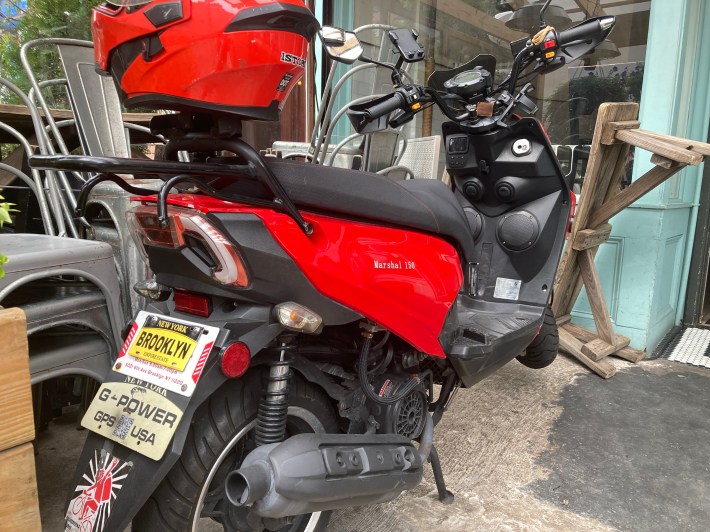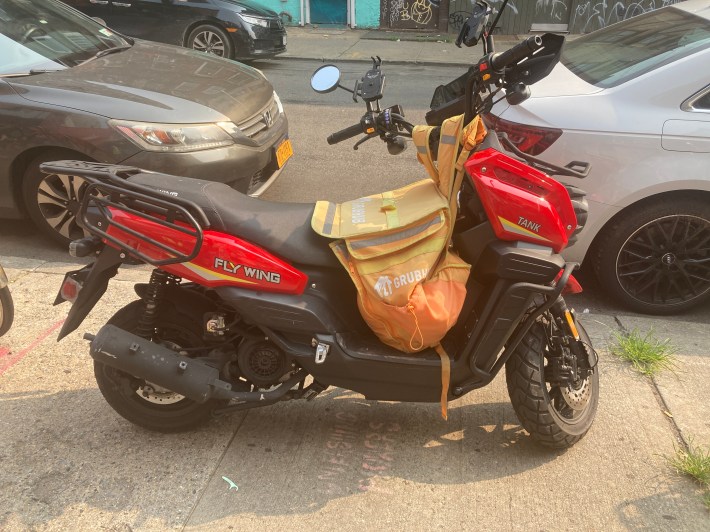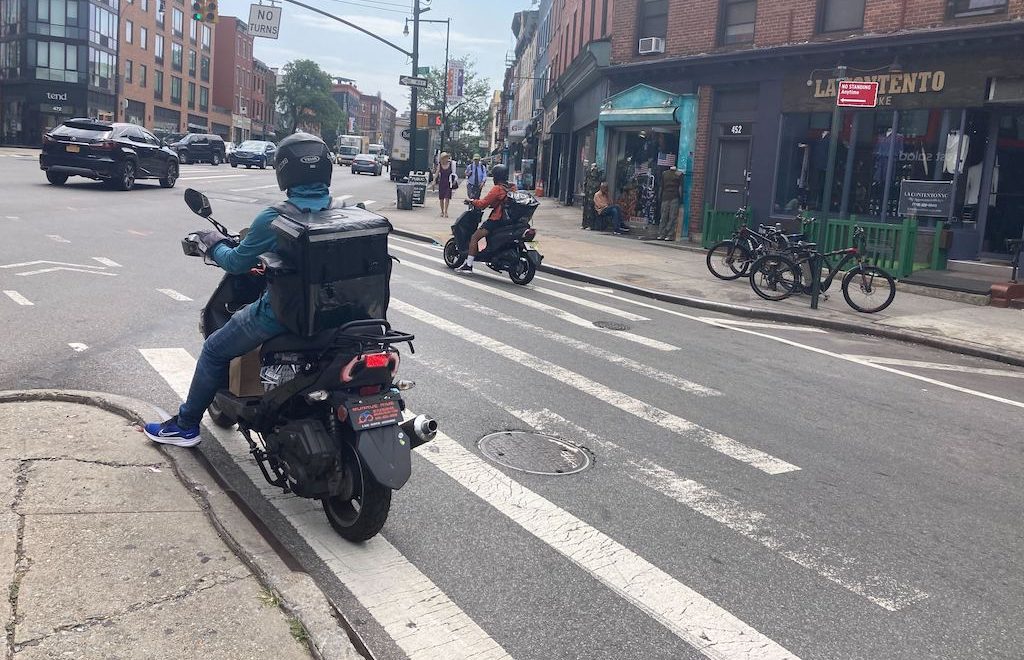It’s not your imagination: more deliveristas are riding gas-powered mopeds, instead of battery-powered e-bikes.
“I bought it because I don’t have a place to charge the electric bike,” Alex, a delivery worker for DoorDash, told Streetsblog in Spanish, outside a bike shop on Flatbush Avenue earlier this week. “And this allows me to travel further and not worry about running out of power.”
Carlos, another delivery worker we met outside a Vanderbilt Avenue restaurant on Monday, said he uses a gas-powered moped because the distances between deliveries were getting longer, and that the battery-powered e-bikes put him at risk for being stranded.
"I work for an app and it takes me to places far away, and with the electric [bike], I can't work for a long time because I have nowhere to charge the batteries," Carlos said in Spanish.

Amid a string of deadly blazes attributed to the shoddy lithium-ion batteries found on cheaper models of e-bikes, city officials have begun to crack down on the devices. Some e-bike shops were shut down after a fire inside a Chinatown storefront killed four people last month, and the city has fined businesses for improper e-bike charging, most recently a hub in Manhattan operated by Grubhub and JOCO. Landlords are also increasingly prohibiting e-bikes inside their buildings.
With fewer places for delivery workers to safely store and charge their electric two-wheeled devices, many deliveristas are turning to the gas-powered vehicles, which are heavier and faster than traditional e-bikes, and require license plates issued by the state DMV.
“There is no place to charge electricity,” said one delivery worker in his native Uzbek outside a Flatbush Avenue fast food restaurant on Thursday.

For the city’s 65,000 delivery workers, who take home an average of $7 per hour before tips, the cost of a certified battery or multiple certified batteries to complete 10- to 12-hour workdays can be prohibitive. (Four of the app-based delivery companies, which do not provide workers with transportation, sued earlier this month to halt the city’s plans for the first-in-the-nation minimum wage for delivery workers.)
“If you use electric you have your battery for like two or three hours and then you got to charge it and let it charge for an hour so you can have a full charge. If you go out of gas you can go to the gas station, use two or three dollars, you got a full tank,” Alan Rodriguez, an Uber Eats delivery worker, said about his motivation for buying a gas-powered moped about two months ago.
One moped shop manager in Sunset Park, who asked to remain anonymous to avoid scrutiny from the authorities, said he’s seen an increase in the number of people shopping for gas mopeds. Not only are the mopeds cheaper — they typically go for about $1,500, while e-bikes can cost upwards of $2,000 — but they don’t come with the same fear and panic that’s associated with lithium-ion batteries, he said.
“They used to get the e-bikes, but you can see all on the news, and people doing some stupid things on the batteries and blowing the whole building down,” the manager said. “Even some landlords don't want e-bikes in their buildings.”
The store manager said he’s not obligated to check whether someone purchasing a moped has the appropriate license and identification as required by state law. Without proper registration, including a license plate and a vehicle identification number, mopeds are otherwise illegal.
“The biggest problem with the [mopeds] is a lot of people doing deliveries on the street don't really have a license. Sometimes they don't even have IDs," the manager said. "They come here without all the paperwork. But they have to make their living. We deal with them everyday."
Another delivery worker — a Bangladeshi immigrant who works for DoorDash, Uber, and GrubHub — told Streetsblog through a translator that the need to charge his e-bike to keep working was a "massive problem" for his bottom line. He plans to switch to a moped (he has already purchased one for $1,400 in Bushwick) once the state approves his license application.
Many workers choose not to wait for a valid license and become targets of NYPD enforcement. Cops in Brooklyn last week seized about a dozen illegal mopeds from delivery workers — a relatively small enforcement action that police from Park Slope's 78th Precinct hailed as "making our streets safer for our community.”
Amid the rise of the gas-powered moped, the NYPD told Streetsblog that cops have inspected just 17 stores this year so far, and three were found to have been selling non-street legal motorized scooters.
The mopeds are putting a strain on the city’s narrow, frequently-used bike lanes — they’re heavier and faster than traditional e-bikes — prompting advocates to wonder how the city should handle their proliferation.
"I would advocate for giving dedicated space to those devices before I would advocate for some kind of enforcement crackdown. You can't enforce your way out of a problem you've created,” said Carl Mahaney, the director of StreetopiaUWS.
"We really need two-tiered bike lanes,” he added. “One that is comfortable for kids to grandparents, then another for those on a clock. Those two uses really don't mix in a five-foot wide strip of painted asphalt.”






